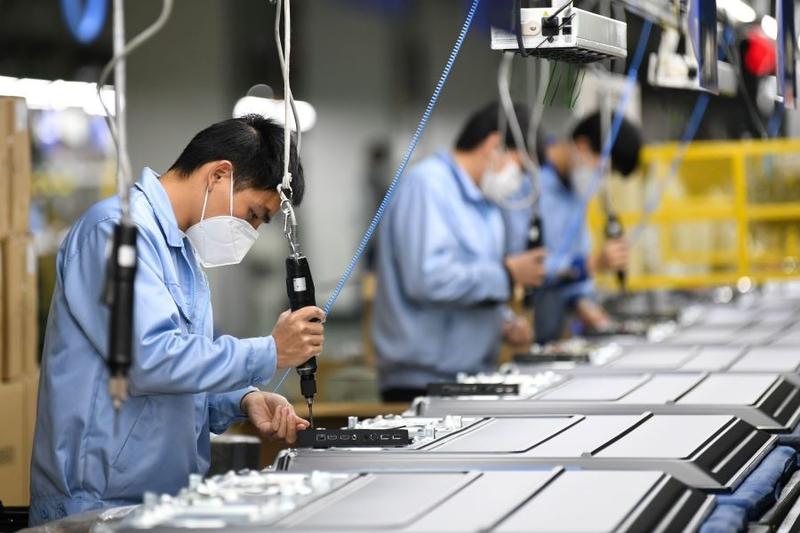 Workers on the TV assembly line at a factory of Skyworth Group in Guangzhou, Guangdong province, on Feb 10. (PHOTO / XINHUA)
Workers on the TV assembly line at a factory of Skyworth Group in Guangzhou, Guangdong province, on Feb 10. (PHOTO / XINHUA)
Despite the expected fallout of the COVID-19 pandemic, home appliances maker Skyworth Group will ramp up its overseas expansion this year with focus on India, Southeast Asia, Europe and Africa.
Liu Tangzhi, chief executive officer of Skyworth, underlined the company's go-global plans. "We want to give top priority to the Indian market and Southeast Asia in our global push."
Skyworth is not focused just on product sales abroad. It has plans to set up manufacturing bases and supply chains, Liu said.
The company will expand its current plants in India as well. Color TVs, refrigerators, washing machines, air conditioners and television set-top boxes are expected to be manufactured in the future, given India's more than 1.3 billion population that promises huge business potential.
We hope to extend our success in the Chinese market to Southeast Asia, India, Africa and Europe and accelerate our layouts in AIoT (artificial intelligence of things) ecosystem
ALSO READ: Skyworth aims to grow its footprint across global markets
In the context of Skyworth's global plans, the European market is of great significance. Skyworth picked up a 100-percent stake in the TV business of German high-end home appliance brand Metz in June 2015. Liu said the company will look for supply chains and plants in eastern Europe next.
The company bought Sinotec, a home appliance brand of South Africa, in September 2014. In 2016, it bought Japanese electronic devices manufacturer Toshiba's factory in Indonesia. With these purchases, Skyworth had accelerated its overseas expansion.
In addition, it will improve its supply chain in South America in a bid to surmount the tariff barrier and further expand its global network in the coming years.
Liu said the Belt and Road Initiative is beneficial for Chinese enterprises to expand overseas as there are not many geopolitical and tariff barriers in the participating countries and regions.
Enterprises should adopt the most appropriate strategy and mode to explore overseas markets, combining the characteristics of different markets with their own development stages and needs, he said.
"We hope to extend our success in the Chinese market to Southeast Asia, India, Africa and Europe and accelerate our layouts in AIoT (artificial intelligence of things) ecosystem," said Wang Zhiguo, chief executive and president of Skyworth TV.
AIoT is the combination of AI technologies with the internet of things or IoT infrastructure to improve human-machine interactions and enhance data management and analytics.
"We have consolidated our presence in overseas markets by establishing worldwide sales networking and joint ventures, and through mergers and acquisitions, adjusting the structure of our product portfolio, as well as by augmenting capital input into the R&D of overseas products and cooperating with upstream chip-makers," Wang said.
He noted the company has also increased its localization efforts, as smart devices or TVs should support localized content and understand local language, adding the establishment of R&D centers in overseas markets is aimed at learning about local language, habits, local content and resources better.
"We don't only sell TV sets, but replicate the Coocaa's system, an internet TV brand and intelligent operating system for Skyworth's products, in overseas markets," Wang said.
Moreover, it also became a key partner for Google Inc in developing Android TV and AIoT smart home businesses, which again helped enhance its global influence.
Founded in 1988, Shenzhen-based Skyworth offers consumer electronics, display devices, digital set-top boxes, security monitors, network communication, semi-conductors, refrigerators, washing machines, cell phones and LED lighting.
Apart from China, it operates in other Asian countries, such as the Philippines, Malaysia, Indonesia, Thailand, Vietnam and India, as well as South Africa, Germany and the Americas.
 Two Skyworth employees assemble TV sets on a production line of the company in Guangzhou on Feb 10, 2020. (PHOTO / XINHUA)
Two Skyworth employees assemble TV sets on a production line of the company in Guangzhou on Feb 10, 2020. (PHOTO / XINHUA)
READ MORE: Skyworth to boost core tech for bigger market share in TV sector
In 2019, its revenue was 37.3 billion yuan (US$5.3 billion), and net profit climbed 23 percent to 839 million yuan on the back of business adjustments and a shift toward more high-end products like set-top boxes with organic light-emitting diode or OLED screens.
Its revenue from overseas markets reached 11.3 billion yuan, up 5 percent year-on-year, contributing more than 30 percent to the company's total revenue.
Data from the China Household Electric Appliances Research Institute showed the revenue of China's home appliance sector reached 803.2 billion yuan last year, down more than 2 percent year-on-year.
Marching into overseas markets has become a new profit growth point for Chinese home appliance companies due to the saturation of the local market and increasing costs of labor, logistics and raw materials.
The traditional TV market is almost saturated and companies need to seek new growth points, said Dong Min, an independent researcher in the home appliances sector.
"Expansion into overseas markets could not only relieve the pressure of high inventory in the domestic market but increase the international influence of Chinese home appliance companies."
Liang Zhenpeng, a consumer electronics analyst, said the growth rate in the domestic home appliance market is dropping so major players should accelerate steps to expand in overseas markets such as North America and South America, Africa and Europe as such markets continue to show huge growth potential in low, medium and high-end products.
"In the past, most of the Chinese enterprises adopted the OEM or original equipment manufacturer model, but nowadays they tend to build their own brands to be competitive globally," Liang said.


